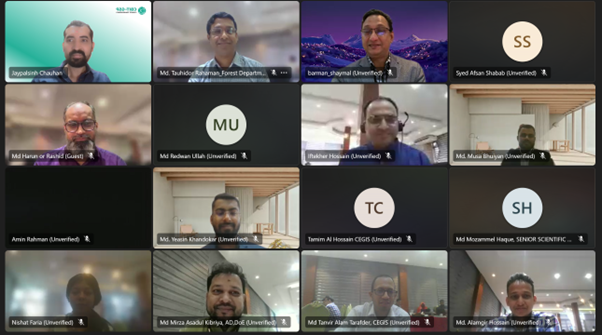Based on support request received from Bangladesh, CBIT GSP has organized the In Country Support Activity for Bangladesh.
Background
The Enhanced Transparency Framework (ETF) under the Paris Agreement represents a significant evolution in climate action reporting. It builds upon and enhances the existing measurement, reporting, and verification (MRV) arrangements under the Convention. The adoption of modalities, procedures, and guidelines (MPGs) for the ETF, along with corresponding common reporting tables, common tabular formats, and outlines, has set the stage for countries to transition to this new framework (Decisions 18/CMA.1 and 5/CMA.3).
The Biennial Transparency Report (BTR) is a cornerstone of the ETF, serving as the primary vehicle for countries to communicate their climate actions and progress. For Bangladesh, as with other developing countries, the preparation of the first BTR presents both an opportunity and a challenge. It offers a chance to showcase national climate efforts while also requiring a comprehensive and detailed accounting of greenhouse gas (GHG) emissions, mitigation actions, and progress towards Nationally Determined Contributions (NDCs).
GHG inventories are crucial components of the BTR, providing insights into emissions and removals from various sources and sinks across economic sectors. These inventories form the foundation for identifying appropriate mitigation actions, developing baseline scenarios, and formulating projections. Under the new requirements, countries must use the 2006 Intergovernmental Panel on Climate Change (IPCC) guidelines and the adopted common reporting tables (CRT) for preparing and reporting national GHG inventories.
The preparation of a high-quality GHG inventory demands adherence to the TACCC principles: transparency, accuracy, completeness, consistency, and comparability. This requires a deep understanding of various components involved in the preparation and management of a GHG inventory, including data collection and management, quality assurance and quality control (QA/QC), verification, key category analysis, recalculation, uncertainty assessment, and improvement planning.
Nationally Determined Contributions (NDCs) are at the heart of the Paris Agreement and its long-term goals. They embody each country's efforts to reduce national emissions and adapt to climate change impacts. The Paris Agreement requires each Party to prepare, communicate, and maintain successive NDCs that it intends to achieve. Tracking NDCs is a key requirement under the ETF, necessitating transparent quantitative and qualitative information on the implementation and achievement of the NDC.
As Bangladesh prepares its first Biennial Transparency Report, strengthening the capacity of its technical team is crucial to ensuring compliance with the MPGs under the ETF of the Paris Agreement. This workshop aims to address specific training needs in Nationally Determined Contribution tracking, GHG inventory management, and financial and technology support reporting. The training will enhance technical expertise and improve the quality, completeness, and consistency of Bangladesh’s reporting under the ETF.
The series of three virtual sessions reflects a targeted and efficient approach to capacity building. By concentrating on the most critical aspects of BTR preparation and NDC tracking, participants will gain the essential knowledge and skills needed to contribute effectively to the Bangladesh' first BTR.
Objectives and purpose of the training
This workshop aims to enhance the capacity of key stakeholders in the Bangladesh to prepare a comprehensive BTR. It will cover the fundamental aspects of the ETF, with particular focus on GHG inventories, NDC tracking, Support needed and received and the use of common reporting tables and common tabular formats. By the end of the workshop, participants will have a solid understanding of the BTR requirements, proficiency in GHG inventory preparation, and the ability to track and report on NDC progress effectively.
The workshop has the following specific objectives:
- Familiarize participants with the Biennial Transparency Report requirements under the Paris Agreement and its Enhanced Transparency Framework (ETF)
- Improve the proficiency of participants in preparing and managing national Greenhouse Gas (GHG) inventories, developing a comprehensive national inventory document, and effectively employing the common reporting table for reporting emissions.
- Strengthen understanding of financial and technological support reporting requirements
- Build institutional knowledge for sustained BTR preparation and submission
- Comprehend the Bangladesh' Nationally Determined Contribution (NDC) commitments
- Understand the linkage between NDC tracking and GHG inventory reporting
- Develop capacity to draft key sections of the BTR, including Common Reporting Tables (CRTs) and Common Tabular Format (CTF)
Expected Outcomes
Upon completion of the training program, participants will have gained the expertise to independently complete CTF tables for NDC tracking and progress reporting. They will be proficient in operating IPCC inventory software and conducting uncertainty assessments, as well as using MITICA for GHG emission projections. The training will enable them to prepare comprehensive reports on financial support and technology transfer, applying MPG guidelines effectively across all reporting areas.
